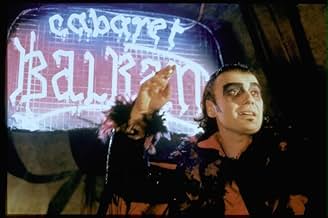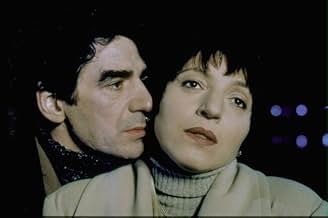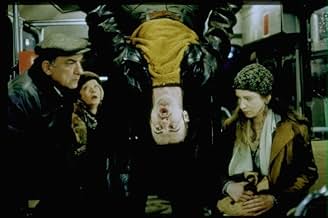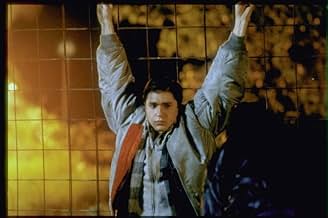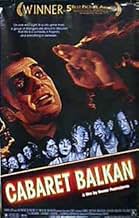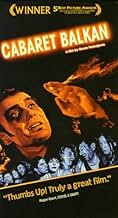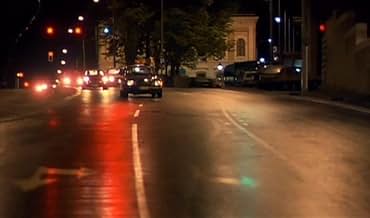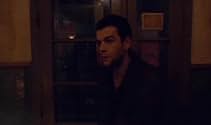AVALIAÇÃO DA IMDb
7,7/10
5,9 mil
SUA AVALIAÇÃO
Adicionar um enredo no seu idiomaRandom Belgrade citizens interact with each other in a night full of crime, frustration, betrayal and revenge.Random Belgrade citizens interact with each other in a night full of crime, frustration, betrayal and revenge.Random Belgrade citizens interact with each other in a night full of crime, frustration, betrayal and revenge.
- Direção
- Roteiristas
- Artistas
- Prêmios
- 8 vitórias e 4 indicações no total
Vojislav 'Voja' Brajovic
- Topi
- (as Vojislav Brajovic)
Predrag 'Miki' Manojlovic
- Mane
- (as Predrag-Miki Manojlovic)
Avaliações em destaque
In one night the 1990s, in Beograd, many violent acts happen almost simultaneously, having as a `touching point' linking all of them the presence of a cab driver. A car crash, a vengeance against a former policeman, a harsh dialog between two boxers friends, a paranoid man in a bus, the anger of a lover against the former passion of his mate, the jealousy of a boy friend, all of these feelings are the motive for an outburst of violence from locals. The Brazilian title (`Powder Keg') metaphorically defines the state-of-mind of the civilian population, ready to explode in a city without law in times of war. I liked the screenplay, the direction and performance of the cast of this low budget movie. However, living in Rio de Janeiro, this black humor theme does not surprise me. My vote is eight.
Title (Brazil): `Barril de Pólvora' (`Powder Keg')
Title (Brazil): `Barril de Pólvora' (`Powder Keg')
There where at least twenty or more characters who took us through the streets of Belgrade in one crazy soul-searching period. Each character has a destiny to meet and each one affected by the Balkan States of political chaos. While the neighboring states continue to abuse the human condition, our symbolic characters are tearing at each other on the streets of Belgrade, in one form or another. Every character represents a state of nationality or the social mayhem drowning them. There is the two boxing buddies who turn on each other after revealing past truths, (the same as the peaceful neighbors of different nationalities who turn on one another when the war heated up). There is the Taxi driver who took revenge on a police officer, (the power of police enforcement riddles the country with corruption ). The man who returns back home to reclaim his lost love after a five year absence and a pocket full of money, (commenting on people who left the country to make their wealth overseas then coming back to buy their privileges). The young Bosnian Serb refuge who teams up with the underworld to make ends meet because it is the only way to survive in a hopeless situation, (commenting on the power of the underworld, taking control of restless and lost youths with no place to go). There are so many criss-cross factors that director Goran manages to inter-weave them all in a Robert Altman style. There are some tales that take the pleasure away from the more interesting small tales, but each one had to be told so as to cover the whole spectrum of the Balkan States in a sea of frenzy.
As truth can be defined by the observer, it is also guided by the artist. This film is as close to truth in film as one can get. The state of the Balkans is one which cannot be easily defined, but understood, if you understand its peoples. The truth of this film lies in the reactionary maelstrom that has been the Balkans for a very, very long time. The film ties the lives together of many, equally bizarre characters and events which are tied together artistically by a collage of madness and life on the edge of it. Please do not miss this film, and watch it several times if possible.
10Zambelli
If you know at least something about the events that took place in former Yugoslavia during the 1990s, you should be able to understand this movie.
Many people have misinterpreted this movie as a vicious depictment of some sick Serbian mentality or an exaggerated vision of a post-war Serbia. None of this is true. The theme of "Cabaret Balkan" is not violence. A great parallel can be made between "Cabaret Balkan" and "A Clockwork Orange". The violence in both movies is not the theme - it's merely an extreme way of proving an important point.
The oppressors and the oppressed. The small fish and the big fish. The dogs and the sheep (rock fans might find interesting similarities between this movie and Pink Floyd's "Animals"). There seems to be certain hierarchy present in "Cabaret Balkan". The passive majority is constantly oppressed by the violent minority, many of whom themselves are victims of "bigger fish". The passive majority is always ready to turn a blind eye, to look the other way or, as a scene from the movie so visually illustrates, sit on a different side of the bus.
Who should the war be blamed on? Is it the government's fault? Or is the fault of the people who elected the government? Should the criminals in power take the blame or the people who let them stay in power? A key scene of the movie which takes place in the bus seems to tell us the most about this issue. "You finally stood up to me", says the young bully to the old man who refuses to play along and answer his insulting questions. In a way, the young bully on the bus is the only real hero of "Cabaret Balkan". He is the only one with the guts to stand up for his rights - everyone else would much rather look the other way, ignore the situation and mind their own business.
The original title of the movie - "Powder Keg", draws its name from an old nickname the Balkan peninsula earned at the beginning of this century - a powder keg ready to explode, with multitudes of people constantly fighting wars, making up, then fighting again. After all, isn't that what all the characters in the movie do? The strange mentality of the Balkan people cannot be easily explained, so director Paskaljevic takes it into extremes and creates extremely surreal scenes, like the one in the boxing ring and the bar. Fight. Drink. Fight. Drink. War. Peace. War. Peace. What's it going to be? Doesn't matter, as long as we're all in "good health".
Many people have misinterpreted this movie as a vicious depictment of some sick Serbian mentality or an exaggerated vision of a post-war Serbia. None of this is true. The theme of "Cabaret Balkan" is not violence. A great parallel can be made between "Cabaret Balkan" and "A Clockwork Orange". The violence in both movies is not the theme - it's merely an extreme way of proving an important point.
The oppressors and the oppressed. The small fish and the big fish. The dogs and the sheep (rock fans might find interesting similarities between this movie and Pink Floyd's "Animals"). There seems to be certain hierarchy present in "Cabaret Balkan". The passive majority is constantly oppressed by the violent minority, many of whom themselves are victims of "bigger fish". The passive majority is always ready to turn a blind eye, to look the other way or, as a scene from the movie so visually illustrates, sit on a different side of the bus.
Who should the war be blamed on? Is it the government's fault? Or is the fault of the people who elected the government? Should the criminals in power take the blame or the people who let them stay in power? A key scene of the movie which takes place in the bus seems to tell us the most about this issue. "You finally stood up to me", says the young bully to the old man who refuses to play along and answer his insulting questions. In a way, the young bully on the bus is the only real hero of "Cabaret Balkan". He is the only one with the guts to stand up for his rights - everyone else would much rather look the other way, ignore the situation and mind their own business.
The original title of the movie - "Powder Keg", draws its name from an old nickname the Balkan peninsula earned at the beginning of this century - a powder keg ready to explode, with multitudes of people constantly fighting wars, making up, then fighting again. After all, isn't that what all the characters in the movie do? The strange mentality of the Balkan people cannot be easily explained, so director Paskaljevic takes it into extremes and creates extremely surreal scenes, like the one in the boxing ring and the bar. Fight. Drink. Fight. Drink. War. Peace. War. Peace. What's it going to be? Doesn't matter, as long as we're all in "good health".
This movie impressed me a lot, however the fine details and message of this movie might very easily escape the unwary viewer. I was lucky to watch the movie with a friend from Ex-Yugoslavia who could point out what exactly lied behind every small gesture or circumstantial hints hidden in a single sentence.
The characters in this movie are in a constant dilemma, half self-inflicted, half caused by higher powers. Yugoslavia at that time is isolated - mentally, economically, morally. There is no valve to let of the steam, so the people take on themselves, murdering, plundering, threatening and raping. Almost every character is shown to be not fully guilty, but nevertheless brought down by their own acts of violence. The bus scene especially shows that the Yugoslavian people have forgotten to take their fate in their own hands. A young men is fed up with the system, his wasted life and the apathy of his people in general. The best scene in the movie for me
Tragic-comically ends this scene like the whole movie. The whole plot takes place one day before the Dayton agreement, another twist of fate, that just on this day those people lose their lives for nothing and absolutely nothing.
When you watch this movie you have to realize the deeper message has been made for the Yugoslavian audience to show them the mechanizations of their lives and their own guilt going with it. He tries to hammer this in the minds of the viewers hence the compressed plot and intermingling of scenes. A masterpiece.
The characters in this movie are in a constant dilemma, half self-inflicted, half caused by higher powers. Yugoslavia at that time is isolated - mentally, economically, morally. There is no valve to let of the steam, so the people take on themselves, murdering, plundering, threatening and raping. Almost every character is shown to be not fully guilty, but nevertheless brought down by their own acts of violence. The bus scene especially shows that the Yugoslavian people have forgotten to take their fate in their own hands. A young men is fed up with the system, his wasted life and the apathy of his people in general. The best scene in the movie for me
Tragic-comically ends this scene like the whole movie. The whole plot takes place one day before the Dayton agreement, another twist of fate, that just on this day those people lose their lives for nothing and absolutely nothing.
When you watch this movie you have to realize the deeper message has been made for the Yugoslavian audience to show them the mechanizations of their lives and their own guilt going with it. He tries to hammer this in the minds of the viewers hence the compressed plot and intermingling of scenes. A masterpiece.
Você sabia?
- CuriosidadesFilmed entirely at night.
- Trilhas sonorasFanfare / Duvacki
Orkestar 'Oluja' Sinisa Stankovica
Principais escolhas
Faça login para avaliar e ver a lista de recomendações personalizadas
- How long is Cabaret Balkan?Fornecido pela Alexa
Detalhes
- Data de lançamento
- Países de origem
- Central de atendimento oficial
- Idioma
- Também conhecido como
- Cabaret Balkan
- Locações de filme
- Empresas de produção
- Consulte mais créditos da empresa na IMDbPro
Bilheteria
- Faturamento bruto nos EUA e Canadá
- US$ 108.103
- Fim de semana de estreia nos EUA e Canadá
- US$ 11.774
- 25 de jul. de 1999
- Tempo de duração
- 1 h 42 min(102 min)
- Cor
- Mixagem de som
- Proporção
- 1.85 : 1
Contribua para esta página
Sugerir uma alteração ou adicionar conteúdo ausente

